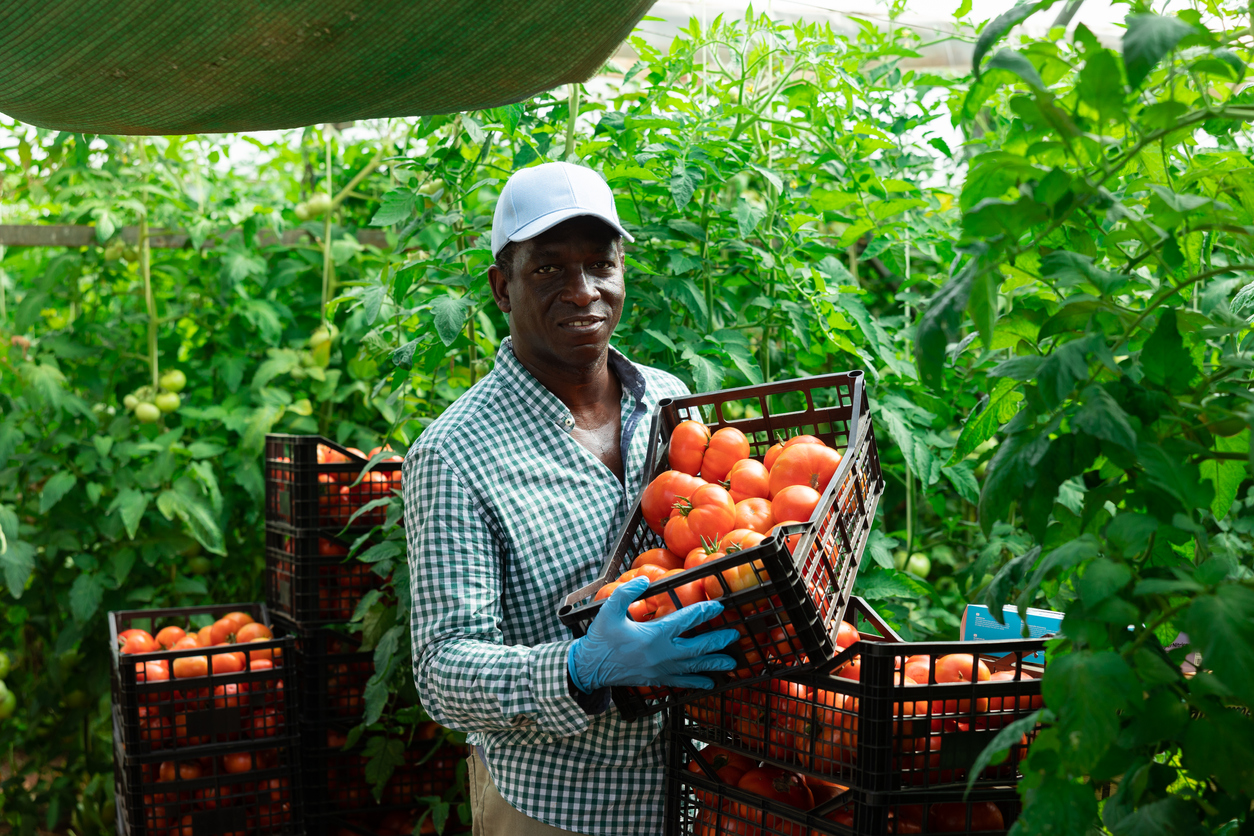Sustainable Solutions for Nigerian Farmers: Wigmore Trading’s Approach to Growing Vegetables, Melons, Roots, and Tubers
Sustainable Solutions for Nigerian Farmers: Wigmore Trading’s Approach to Growing Vegetables, Melons, Roots, and Tubers
Welcome to our blog, where we explore groundbreaking solutions that are revolutionizing the agricultural landscape in Nigeria! Today, we delve into an inspiring story of Wigmore Trading and their extraordinary approach to sustainable farming. As farmers across Nigeria face numerous challenges, from climate change to limited resources, Wigmore Trading has emerged as a beacon of hope with their innovative methods for cultivating vegetables, melons, roots, and tubers. Join us on this exciting journey as we uncover how they are not only growing crops but also empowering local farmers and fostering a greener future for all.
Introduction to the Importance of Sustainable Farming in Nigeria
Introduction to the Importance of Sustainable Farming in Nigeria
Nigeria is a country with vast agricultural potential, with over 84 million hectares of arable land and a growing population that heavily relies on agriculture for food security and economic growth. However, traditional farming practices and rapid urbanization have put significant strain on the environment, leading to soil degradation, water scarcity, and biodiversity loss.
This has highlighted the urgent need for sustainable farming practices in Nigeria. Sustainable agriculture refers to methods of producing food, fiber, or other plant or animal products using techniques that protect the environment while also ensuring long-term productivity. It aims to strike a balance between meeting present needs without compromising the ability of future generations to meet their own needs.
The importance of sustainable farming in Nigeria cannot be overstated. Here are some key reasons why adopting sustainable farming practices is crucial for Nigerian farmers:
1. Environmental Preservation
Sustainable farming methods prioritize environmental preservation by reducing chemical inputs such as fertilizers and pesticides that can pollute soil and water systems. Instead, these methods focus on natural solutions like crop rotation, intercropping, and organic fertilizers to maintain soil health and biodiversity.
What is Wigmore Trading and Their Approach to Sustainable Farming?
Wigmore Trading is a leading agricultural company in Nigeria that specializes in sustainable farming practices. Their mission is to provide high-quality produce while promoting long-term environmental and social sustainability.
Their approach to sustainable farming involves taking into consideration the needs of both farmers and the environment. They understand that farmers need efficient and cost-effective solutions, while the environment requires responsible and sustainable practices to thrive.
One of Wigmore Trading’s core principles is the use of organic methods in their farming processes. This means using natural fertilizers, such as compost or animal manure, instead of chemical-based ones. They also prioritize crop rotation and intercropping techniques to maintain soil health and reduce pest infestations.
In addition, they promote water conservation through drip irrigation systems, which deliver water directly to plant roots, minimizing evaporation and reducing water waste. This method also ensures that plants receive an adequate amount of moisture without over-watering them.
Furthermore, Wigmore Trading prioritizes biodiversity by incorporating a variety of crops on their farms. By planting diverse crops, they create a more balanced ecosystem that supports natural pollinators like bees and butterflies. This not only benefits the environment but also improves crop yields through increased cross-pollination.
Another aspect of their sustainable approach is working closely with local communities to implement fair labor practices and promote social responsibility. This includes providing training programs for farmers on sustainable farming techniques and supporting small-scale farmers by purchasing their produce at fair prices.
Benefits of Growing Vegetables, Melons, Roots, and Tubers in Nigeria
Nigeria is a country with a vast agricultural potential, and one of the most promising sectors in this field is the production of vegetables, melons, roots, and tubers. These crops are considered to be important for both food security and economic growth in Nigeria. In this section, we will explore some of the key benefits of growing these particular crops in Nigeria.
1. Increased Food Security:
One of the main benefits of growing vegetables, melons, roots, and tubers is that it contributes to food security in Nigeria. These crops are an essential part of the Nigerian diet and are consumed on a daily basis by many Nigerians. By growing these crops locally, farmers can ensure a steady supply of fresh produce throughout the year. This reduces reliance on imported vegetables and other staple foods, ultimately leading to increased food security.
2. Diversification of Agriculture:
The cultivation of vegetables, melons, roots,and tubers provides farmers with an opportunity to diversify their sources of income. With increasing global demand for these crops due to their nutritional value and health benefits, there is a huge market potential for farmers who specialize in their production.
3. High Nutritional Value:
Vegetables like spinach, cabbage, carrots are rich sources of vitamins A,C,E,K as well as minerals such as iron calcium magnesium among others while melons contain high levels of Vitamin C which boosts immunity against diseases like scurvy; making them incredibly nutritious additions to any meal . Roots such as cassava have high levels of carbohydrates, making them a great source of energy. Tubers like yams and sweet potatoes are also rich in vitamins and minerals, making them an important part of a healthy diet.
4. Employment Opportunities:
The cultivation of vegetables, melons, roots, and tubers creates employment opportunities for many Nigerians. As the demand for these crops increases, so does the need for labor in cultivation, harvesting, processing, and marketing. This provides job opportunities for individuals at different levels of expertise in the agricultural sector.
5. Boost to the Economy:
The production of vegetables, melons, roots,and tubers contributes significantly to Nigeria’s economy. These crops can be grown on a large scale and have high market value both domestically and internationally. When properly managed and marketed, they can generate substantial income for farmers and contribute to the country’s GDP.
6. Environmental Benefits:
Growing vegetables,melons ,roots,and tubers can have positive environmental impacts as well. These crops can be grown using organic methods which reduce the use of harmful chemicals that can damage the soil and water resources. They also have a shorter growth cycle compared to other crops, allowing farmers to rotate their crops more frequently and maintain soil fertility.
Challenges Faced by Nigerian Farmers and How Wigmore Trading Helps Overcome Them
Challenges faced by Nigerian farmers are numerous and varied, ranging from environmental factors to economic constraints. Some of the major challenges include inadequate access to modern farming techniques and technology, limited access to financing, lack of infrastructure such as roads and irrigation systems, fluctuating market prices, and climate change.
One of the biggest challenges faced by Nigerian farmers is the lack of access to modern farming techniques and technology. Many small-scale farmers in Nigeria still use traditional methods such as hand tools for cultivation, which can be time-consuming and labor-intensive. This results in low productivity and limits their ability to compete with larger commercial farms. Additionally, most small-scale farmers do not have access to advanced farming technologies like irrigation systems or modern machinery, making it difficult for them to increase their yields.
Limited access to financing is another major challenge facing Nigerian farmers. Most small-scale farmers do not have enough capital to invest in their farms or purchase high-quality seeds or fertilizers. As a result, they are unable to maximize their production potential and often struggle with low crop yields.
Lack of infrastructure is also a significant challenge for Nigerian farmers. Poor road networks make it difficult for them to transport their produce from rural areas to urban markets where they could fetch better prices. Inadequate storage facilities also lead to post-harvest losses, reducing the income earned by these small-scale farmers.
Tips for Implementing Sustainable Farming Practices in Your Own Farm or Garden
Implementing sustainable farming practices is crucial for the long-term success and viability of any farm or garden. Not only does it help in preserving the environment and natural resources, but it also promotes healthy and productive crops. In this section, we will discuss some tips for implementing sustainable farming practices in your own farm or garden.
1. Practice Crop Rotation:
Crop rotation involves planting different types of crops in a particular area over a period of time. This helps in reducing soil erosion, controlling pests and diseases, and maintaining soil fertility. By rotating crops, you can also avoid depleting certain nutrients from the soil, as different plants have varying nutrient requirements.
2. Use Organic Fertilizers:
Instead of relying on chemical fertilizers that can harm the environment and reduce soil quality in the long run, opt for organic fertilizers such as compost or manure. These natural fertilizers not only provide essential nutrients to your plants but also improve soil structure and increase water retention.
3. Regular Soil Testing:
Soil testing is an important aspect of sustainable farming as it allows you to understand the nutrient levels and pH balance of your soil. Based on these results, you can make informed decisions about which crops to grow and which fertilizers are needed.
Conclusion: The Future of Sustainable Farming
Conclusion: The Future of Sustainable Farming
As more and more people become aware of the importance of sustainable farming, it is clear that this approach to agriculture is the future. Not only does it prioritize ethical and environmentally friendly practices, but it also ensures long-term viability for farmers and their communities.
Wigmore Trading’s commitment to sustainable solutions for Nigerian farmers has already shown promising results in terms of increased crop yields, improved soil health, and reduced environmental impact. But what does the future hold for sustainable farming in Nigeria?
One key aspect that will shape the future of sustainable farming is technology. With advancements in technology, farmers can now utilize precision agriculture techniques such as satellite imagery, drones, and sensors to gather data on soil health, moisture levels, and plant growth. This allows for more targeted and efficient use of resources such as water and fertilizers. Additionally, the use of biotechnology in developing drought-resistant seeds or disease-resistant crops can greatly benefit small-scale farmers who are vulnerable to climate change.
Another important factor is access to markets. Sustainable farmers often face challenges in accessing markets due to lack of infrastructure or unfair trade policies. However, with increasing consumer demand for sustainably grown produce, there is a growing market for these products both domestically and internationally. Organizations like Wigmore Trading play a crucial role in connecting sustainable farmers with buyers who value ethically produced food.








Comments are closed.